Cafe (British)
In Britain a cafe - or occasionally "working men's cafe" or "transport cafe" and colloquially "caff"/ˈkæf/ or "greasy spoon"[1]- is a small, cheap eatery typically specialising in fried foods and/or home-cooked meals. Though it uses the same word origin it is sometimes distinct from the term "café" which is generally used to refer to a coffeehouse, tea shop, or European bar serving alcohol.[2][3][4] A British cafe does not usually serve alcohol.[5] It is commonly an independently owned business; the only notable chain of roadside cafes is OK Diner since the demise of Happy Eater in 1997 and Little Chef in 2018.

Menu
A British cafe typically offers fried or grilled food such as an all-day "full cooked breakfast", which may contain a combination of ingredients such as fried egg, bacon, black pudding, bubble and squeak, hash browns, baked beans, fried bread, toast, grilled tomato, burgers, sausages, mushrooms and chips.[6] Hot and cold sandwiches may be available, such as a bacon butty or sausage sandwich. A range of other cooked meals may be available, such as steak and kidney pie, a full roast, or liver and onions, with a cooked dessert such as apple crumble and custard.[1] The main drink in a cafe or greasy spoon is usually tea, especially "builder's tea" (a nickname for a mug of strong black tea, such as English breakfast tea, usually served with milk and sugar and typically robust and flavourful with a brisk character and a dark red colour). Coffee, where available, is usually instant or sometimes espresso but rarely brewed.
Transport cafe
The cafe was the mainstay of British lorry drivers who travelled the major trunk roads such as the A1 and the A6 prior to the opening of the motorways. These cafes were not only stops where the driver could eat, but also made convenient meeting places where the trade unions could talk to their members.[7] A cafe that is beside a main road and serves passing motorists, particularly lorry drivers, is a transport cafe; this may or not be accompanied by a petrol station. A motorway service station will typically include one or more fast food restaurants such as Burger King, Greggs, or McDonald's, and possibly a transport cafe for the lorry drivers.[8]
See also
- Ace Cafe (Historic transport cafe)
References
- Duncan Smith (13 February 2015). "Cafe culture: The survival of the traditional British 'caff'". bbc.co.uk.
- Take the Kids England, 3rd. Fullman, Joseph. New Holland Publishers, 1 June 2007. p. 21
- Britslang: An Uncensored A-Z of the People's Language, Including Rhyming Slang Puxley, Ray. Robson, 1 April 2005. p. 216
- Shorter Slang Dictionary. Fergusson, Rosalind; Partridge, Eric; Beale, Paul. Psychology Press, 1994
- "Definition of 'café'". collinsdictionary.com.
- We're British, Innit: An Irreverent A to Z of All Things British. Iain Aitch. HarperCollins UK, 1 October 2010
- "In Ernie Bevin's Steps". Time Magazine. No. 2 September 2002. 1957.
- "Brands at Motorway Services". motorwayservicesonline.co.uk.
External links
- Classic Cafes – The Very Best of London's Twentieth Century vintage Formica caffs